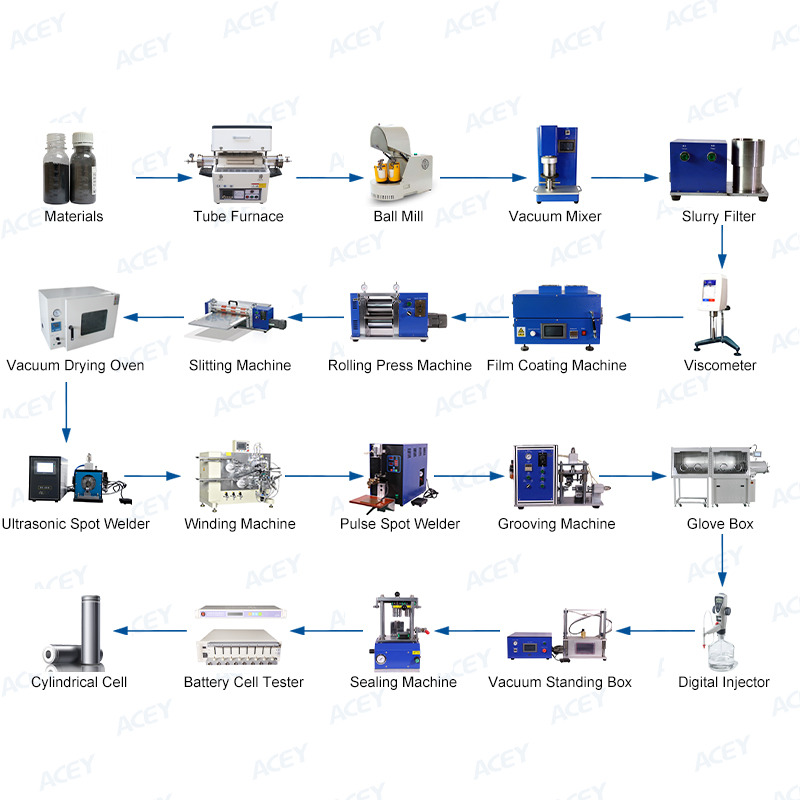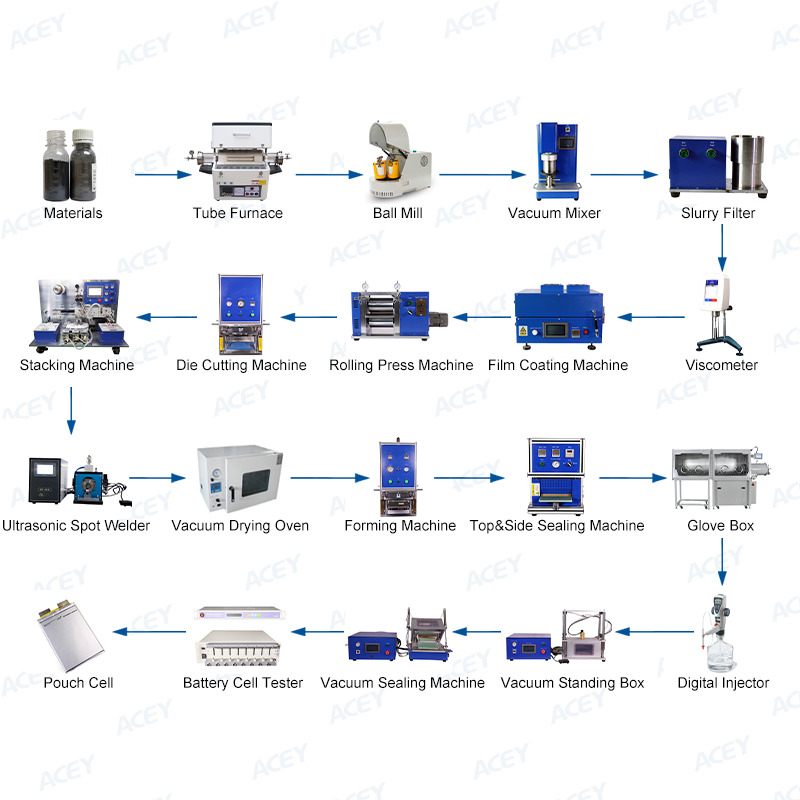Celda cilíndrica 18650 vs. celda de bolsa
Las baterías cilíndricas 18650 y las baterías de polímero (tipo bolsa) son dos tipos comunes de baterías de litio, y presentan diferencias en estructura, rendimiento y aplicaciones. A continuación, se presenta una comparación detallada de las principales diferencias:
1. Estructura y forma del embalaje
Celda cilíndrica 18650:
Se trata de un cilindro rígido: una carcasa metálica (generalmente de acero o aluminio) revestida, cuyo interior consta de un electrodo positivo, un electrodo negativo, un diafragma, un electrolito y una válvula de seguridad. La batería 18650 tiene un único tamaño: 18 mm de diámetro y 65 mm de altura (el "0" significa cilíndrico), y el modelo es fijo para un diseño modular. La batería tiene un diseño a prueba de explosiones: está equipada con una válvula de seguridad en la parte superior para liberar la presión interna en caso de sobrepresión, lo que reduce el riesgo de explosión.
Célula de bolsa
Embalaje flexible: La película compuesta de aluminio y plástico (capa exterior de nailon/PP, capa intermedia de papel de aluminio, capa interior de sellado térmico) se utiliza como carcasa y la celda de batería interna tiene una estructura laminada o enrollada.
Forma flexible: se puede personalizar como ultrafino, cuadrado o con forma especial para adaptarse a las necesidades de espacio de diferentes equipos.
2. Densidad energética
Celda cilíndrica 18650:
La densidad energética volumétrica es baja (aproximadamente 250-300 Wh/L) debido a los huecos en la estructura cilíndrica (tasa de utilización de aproximadamente el 60-70 % al agruparse). La capacidad del monómero suele ser de 1200-3500 mAh (como las celdas de batería ternaria de litio).
Célula de bolsa:
La densidad de energía es mayor (300-400 Wh/L), debido a la falta de carcasa de metal y la alta tasa de utilización del espacio (la tasa de utilización del grupo puede alcanzar más del 90%), la capacidad única puede alcanzar fácilmente decenas de Ah (como celdas de batería de gran capacidad para vehículos eléctricos).
3. Seguridad y gestión térmica
Celda cilíndrica 18650:
La carcasa metálica es resistente a la perforación, pero puede producirse una llama de "chorro" (alivio de presión dirigido por la válvula de seguridad) en caso de fuga térmica. Se requiere un diseño complejo de disipación de calor al agrupar (p. ej., la disposición de la tubería de refrigeración líquida de Tesla).
Célula de bolsa:
La película plástica de aluminio puede derretirse a altas temperaturas, pero cuando no se controla térmicamente, generalmente se hincha y la llama se propaga más lentamente.
El área de disipación de calor es grande, pero necesita depender de la gestión térmica a nivel del módulo (como un adhesivo conductor térmico y una placa de enfriamiento).
4. Costo y fabricación
Celda cilíndrica 18650:
La producción automatizada está madura y el coste de fabricación de monómeros es bajo, pero el coste de los conjuntos es elevado (soldadura, piezas estructurales, etc.).
Adecuado para productos estandarizados, como portátiles, herramientas eléctricas.
Célula de bolsa:
El costo de las materias primas es bajo, ya que la película de aluminio y plástico es más económica que la carcasa metálica, pero el proceso de envasado es complejo y el rendimiento de producción es alto. Es más adecuada para escenarios personalizados, por ejemplo, el diseño personalizado de baterías para fabricantes de automóviles.
5. Comparación de ventajas y desventajas
Características | 18650 | Célula de bolsa |
densidad de capacidad | medio | alto |
seguridad | La seguridad individual es buena, pero el riesgo del grupo es alto. | La fuga térmica es leve, pero la resistencia mecánica es deficiente. |
cálculo de costos | La unidad individual es baja, mientras que el grupo es alto. | El coste del material es bajo, pero el coste del proceso es alto. |
vida | Alto recuento de ciclos (aproximadamente entre 500 y 1000 veces) | Afectado por el envejecimiento del material de embalaje (300-800 veces) |
aplicabilidad | productos estandarizados | Diseño personalizado |
Elija baterías cilíndricas 18650: Escenarios que requieren alta confiabilidad, estandarización e insensibilidad al espacio (por ejemplo, herramientas eléctricas).
Célula tipo bolsa: Escenarios que buscan un diseño liviano, de alta densidad energética y flexible (por ejemplo, vehículos eléctricos, electrónica flexible).
Con el avance de la tecnología, ya no existe una línea divisoria clara entre ambos. Algunas baterías cilíndricas de gran tamaño han aumentado la densidad energética, y las baterías de bolsa también han optimizado la eficiencia de la agrupación de bolsas mediante innovación estructural. En el futuro, esperamos ver más innovaciones tecnológicas que combinen lo mejor de ambas.


Acey Intelligent's Nuestro negocio cubre máquinas de fabricación a escala de laboratorio para celdas de moneda, cilíndricas y de bolsa, cilíndricas, sistemas de prueba de celdas y paquetes de batería, prismáticas, máquinas de ensamblaje semiautomáticas y completamente automáticas de paquetes de baterías de bolsa, etc. Si tiene alguna necesidad, no dude en contactarnos en cualquier momento.








